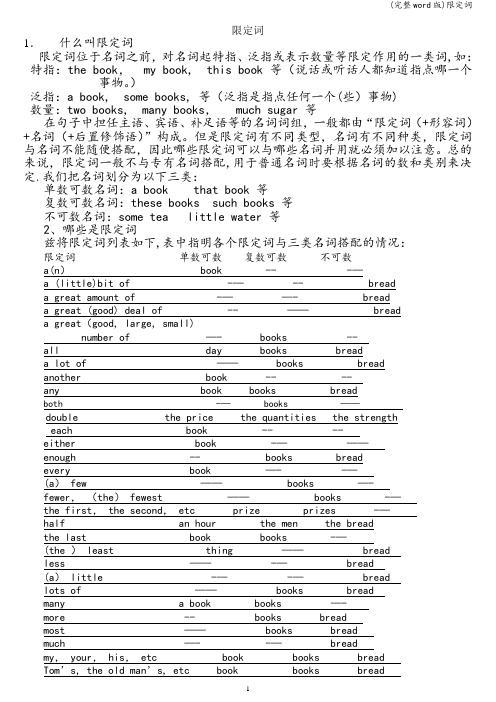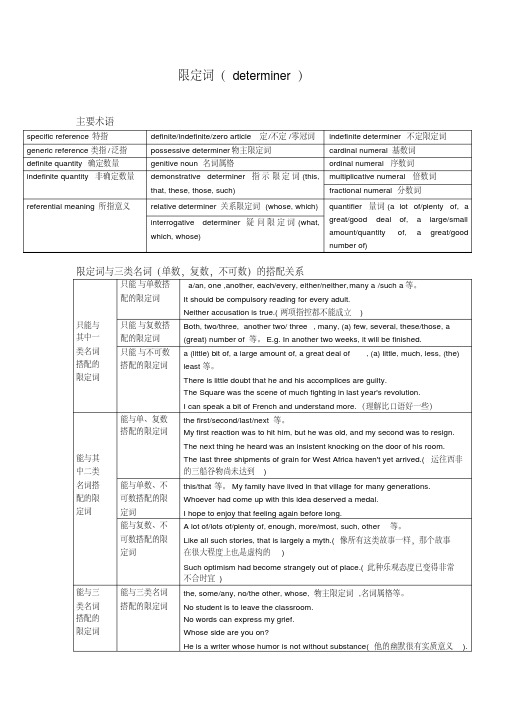初中英语语法专题(三) 限定词(二)(word版)
(完整word版)初中英语语法大全精华版(2)-推荐文档

初中英语语法大全语法网络图十二。
倒装句十三。
虚拟语气十四。
重要句型1.It was not until midnight that he finished his task.2.Not until he came back from abroad was I able to see him again. 3.The harder you work, the greater progress you will make.4.He walked around the house, gun in hand.5.May you be in good health!6.Wish you a pleasant journey back home!7.The professor was a humorous man with big nose and deep-set eyes.8.What surprised me most was his imagination and patience.9.He lay on the grass, with his eyes looking at the sky and his hands under his head. 10.Sitting under the tree are Mr.Green and his first teacher.11.On the wall hang two pictures of famous scientists.12.Looking back upon those past years, he couldn’t help feeling very proud.13.No sooner(Hardly) had he arrived at the theatre than(when) the play started.14.Young as he is, he has learned advanced mathematics.15.How I regret the hours wasted in the woods and fields!16.There stands a beautiful vase in the corner of the room.17.Ten miles north of the town lies a paper factory.18.There goes the bell.19.Nowhere has the world ever seen such a bird as here.20.It is no use crying for help.21.If only I had been your student in the middle school!22.It is believed that such a thing will not happen again.23.Only when he explained did I realize the reason for this.24.“He works particularly hard.”“So he does, and so do you.”25.Not only Alice but also Jane and Mary are tired of having one examination after another.26.Such was Albert Einstein, a simple person of great achievements.十五。
限定词详细总结二

限定词详细总结二2. some vs any•some + 名词单数:表示某个,某种,相当于 a certain •any + 名词单数:表示任何,相当于 every•some / any + 名词复数:表示一些•some:后边加名词,用于肯定句中表“一些”(这种用法不是很多)o She’s got some interesting ideas.o There are some letters for me.•any:也表示一些,① 用于疑问句和否定中用来替换some,② if 条件句中替换 someo Do you know any jokes?o I haven’t got any money.o If you find any mistakes, please tell me.o There aren’t any letters for me.o Are there any letters for me?o I seldom get any sleep these days.o If you have any trouble, please let me know.如果你有任何麻烦,请让我知道。
o l forgot to ask for any change.我忘了要一些零钱。
•在疑问句中,当期待人们给出肯定回答时,用 some,而不用 anyo Could I have some coffee ?Sure, And would youlike some biscuits?o Are there some letters for me?o Could I have some of these apples?o Would you like some chocolate cake?•当 some 与单数可数名词搭配时, some 相当于 acertain (“某一”) 的含义; 而 any 与单数可数名词搭配,则相当于every (“任何一个”〕的含义。
(完整word版)限定词

限定词1.什么叫限定词限定词位于名词之前,对名词起特指、泛指或表示数量等限定作用的一类词,如:特指:the book, my book, this book 等(说话或听话人都知道指点哪一个事物。
)泛指:a book, some books, 等(泛指是指点任何一个(些)事物)数量:two books, many books, much sugar 等在句子中担任主语、宾语、补足语等的名词词组,一般都由“限定词(+形容词)+名词(+后置修饰语)”构成。
但是限定词有不同类型,名词有不同种类,限定词与名词不能随便搭配,因此哪些限定词可以与哪些名词并用就必须加以注意。
总的来说,限定词一般不与专有名词搭配,用于普通名词时要根据名词的数和类别来决定.我们把名词划分为以下三类:单数可数名词:a book that book 等复数可数名词:these books such books 等不可数名词:some tea little water 等2、哪些是限定词兹将限定词列表如下,表中指明各个限定词与三类名词搭配的情况:限定词单数可数复数可数不可数a(n) book -- -—a (little)bit of -— -- breada great amount of -——- breada great (good) deal of -- —— breada great(good, large, small)number of —- books --all day books breada lot of —— books breadanother book -- --any book books breadboth -— books ——double the price the quantities the strengtheach book -- --either book -———enough -- books breadevery book —- -—(a) few —— books —-fewer,(the) fewest —— books -—the first, the second, etc prize prizes -—half an hour the men the breadthe last book books -—(the ) least thing —— breadless —— -— bread(a) little -— -— breadlots of —— books breadmany a book books —-more -- books breadmost —— books breadmuch —- -— breadmy, your, his, etc book books breadTom’s, the old man’s, etc book books breadneither book -- --the next book books --no book books breadone book ———-one-third, two—fifths, etc (of)the book (of) the books the timeother student students breadthe other book books --plenty of —- books breadseveral -- books --some (某一)book books breadsuch book books breadthat book books breadthe book books breadthese -— books —-this book -— breadthose -- books ——twice, three times, etc the figure the quantities his strengthtwo, three, etc —- books --what(ever) book books breadwhich(ever) book books breadwhose book books breadzero(不用冠词或其它限定词) man men bread[注] 表内“-”表示有关限定词不能与该类名词搭配.限定词的搭配 1、概说名词词组中,当两个或两个以上的限定词同时出现时,限定词之间有一定的搭配关系,根据其不同的搭配位置可分为三类,其中最重要的一类是中位限定词,:Write your answer on every other line。
英语语法--限定词,冠词

1〕类指 类指是表示类别,也就是泛指一类人或物。不论是定冠词还是不 定冠词和零冠词都具有这种功能。 比如定冠词与单数可数名词搭配,往往可起类指的作用,常用于 正式语体。 例如: Galileo claimed that he had invented the telescope. GALILEO 声称他发明了望远镜。 The horse has been replaced by the railroad, the windship by the steamship. 铁路代替了马的作用,汽船代替了帆船。 定冠词与某些形容词或分词连用,表示类别或抽象概念,也是一 种类指用法。 例如: the rich 富人; the living 生者。表示一类人。 The sick have been cured, the lost have been found, and the dead have been revived. 病被治逾,失去的被找回来了,死亡被挽救回来了。 The true, the good and the beautiful would not exist without the false, the evil and the ugly. 没有欺骗、邪恶、丑陋就没有真实、善良和美 丽。
用不定冠词与单数可数名词搭配也可表示类别。 例如: My brother William is planning to be a lawyer. 我的兄弟 WILLIAM打算成为律师。 用零冠词与复数可数名词或不可数名词搭配,同样可以 表示一类的人或物。 例如: Doctors are badly needed at the front. 在前线医生是非常 地需要。 Carrots are my favorite vegetable. 胡罗卜是我最喜爱的蔬 菜。 Electricity is a form of energy. 电是能量的一种形态。 Unity is strength. 团结就是力量。
第三单元 限定词,形容词、副词及比较等级稿

• 名词性定语(包括动名词)
• the first beautiful little white Chinese stone bridge • 那第一座漂亮的中式小白石桥
有些形容词的次序可以颠倒而意义不变, • 如 a thin dark face • 也可以说 a dark thin face 有时意义会改变 • 如 dirty American magazines • 弄脏了的美国杂志 • American dirty magazines • 美国的淫秽杂志
3) as + 形容词原级 + 名词词组 + as • Tom is as intelligent a student as Mike.
4) more …than
(比较级+than)
Tom is taller than his brother. Tom is more intelligent than his brother.
• • •
3)“定冠词+表示国籍的形容词”可泛指整个民族或 国人 the English
•
4)“定冠词+某些复数名词”可泛指一定的民族,阶 级或国人 the Chinese / the upper class / the intellectuals
3 其他用法
• 1)在表示某些独一无二的事物时,要用定冠词 • the sun ,the earth
•
• • • • •
both the twin brothers (前位 + 中位) all his three bothers (前 + 中 + 后) all other students (前 + 后) some such alloy (中 + 后) those last few months (中 + 后 + 后)
限定词2全学习

冠词● a 辅音因素开头的名词前, an 元音因素开头的名词前●单数可数名词:不能单独使用,必须用冠词或其他限定词●复数可数名词 or 不可数名词:(1)不能同冠词连用(2)复数名词 or 不可数名词泛指:不用theLife is hard sometimes特指:用theThe writer is writing a book about the life of blacks in America.I love music, poetry and art.I don’t like the film, but I like the music(of the film)表示特指的时候,一般会带有后置定语●第一次提到单数可数名词前用不定冠词a/an,再次出现要用定冠词the●谈到对话双方都知道的事物要用the(比如自己房间里的东西)can you turn off the light, please?●表示世界上独一无二的事物用thethe earth, the sky, the equator, the moon, the world, the universe●做形容词的only、最高级、序数词修饰的名词前+thethe only/best way to cope with the problem.this is the first time I’ve come to Beijing.●乐器、乐团+the(运动不+the)[play football/chess/tennis]the Beatlesthe Philaadelphia Orchestraplay/learn the guitar learn the piano●独一无二的身份不+theHenry was elected chairman of the committeeFor the first time I am king of myself●限定词彼此互斥,不能同时出现在名词前面(1)冠词:the an a(2)物主形容词: my your his her our their(3)指示形容词: this that these those(4)名词属格:Tom’s John’s●特殊名词前省略the(1)nature : in nature (2)society: in society (3)space: in space(4)man在泛指整个人类时,不加冠词(5)history在泛指整个历史时,不加冠词(6)三餐前不+冠词:have something for breakfast/lunch/supper/dinner●交通工具若用介词on:+冠词the(on foot 步行不加the)on the train/plane/boat若不用介词on,如用by时,不加the: by bicycle/boat/bus/car/plane/train/metro●其他固定介词搭配face to face , arm in arm , hand in hand , shoulder to shoulder , side by sideinch by inch , day after day , dentist after dentist●school/the schoolbed, church, court, hospital, prison, school/college/unversity, sea, work, office 当人们去这些地方做在这些地方应该做的事情时,不加冠词,表示抽象概念当要去这些地方不是要做特定的事,而是由于其他原因,要用thehis mother is in hospital and he has been in the hospital to take care of her.Bill Blinton came into office in 1992./Bill Clinton came into the office and saw sth. to church(to pray)to hospital(as patients)to/at sea(出海/在海上)to/at/from(去上班/在上班/下班)go to sea(as sailors) go to the sea(go to the seaside)be at sea(as passengers or crew) be at the sea(be at the seaside)by sea(by ship)by the sea(by the seaside)be in office(在任职) be in the office(在办公室里)be out of office(离职) be out of the office(离开办公室)●泛指的四种表达1.不带the的不可数名词I like music2.不带the的复数可数名词bananas are yellow I am afraid of dogs3.the+单数可数名词(也可表示特指)the whale is the largest mammal on earththe whale is dead4.a/an+单数可数名词(也可以表示一个)I ate a banana this morningA banana is yellow。
初中英语语法专题(三)限定词(二)()

专题三第三讲限定词(二)在英语中,限定词是在名词词组中对名词中心词起特指、泛指(冠词),表示确定数量(数词)和非确定数量(不定代词)等限定作用的词类.名词词组除有词汇意义外,还有其所指意义, 是特指(即指特写的对象〕,还是泛指(即泛指一类人或物〕;是有确定的数量,还是没有确定的数量.表示名词的非确定数量的不定限定词有(不定代词):n o, some, any, each, every, enough, either, neither, all, both, half, several, many, much, (a) few, (a) little, other, another 等.接下来我们分类一一讲解。
数量限定词(一): a few,few/a little,little(四个小不点)与名词的搭配关系: a few 和few 的后面只能接复数名词,而 a little 和little 的后面只能接不可数名词。
例如: a few days, few boys a little water, little money肯定/否定之别: a few 和a little 的意思是肯定的,相当于some,表示“有一些”的意思。
而few 和little 的意思是否定的,表示“很少,几乎没有”。
例如:His theory is rather difficult; few people understand it.=His theory is rather difficult; almost no people understand it. 他的理论很深奥,没什么人能够理解。
His theory is rather difficult, but a few people understand it. 他的理论很深奥,但有一些人能够理解。
Ihave little interest in English, so I am very poor at it. 我对英文没什么兴趣,所以学得很不好。
英语语法限定词

Electricity is a form of energy.
Unity is strength.
definite specific reference 确定特指(非常明确地指出何人
定冠词常有此种功能。 We own a dog and a cat. The dog is brown. And the
the/a/an/zero, this/that, these/those, some/any, no, every/each, either/neither, enough,
what(ever)/which(ever)/whose, 物主限定词,名词属格等。 基数词,序数词, next/last, other/another, many/much(a lot of, plenty of, a great
amount of.
Much information is now transmitted through e-mail.
There is much coal in the mine.
You can take as many copies as you need.
They can spend as much money as they need on the project.
限定词的先后顺序:前位 ---中位 ---后位 (一个名词中心词之前不可并用两个前位 限定词或两个中位限定词 )
前位限定词 predeterminer 中位限定词 central determiner 后位限定词 postdeterminer
Examples
all, half, both, double, 倍数词,分数词, what, such a/an 等。
- 1、下载文档前请自行甄别文档内容的完整性,平台不提供额外的编辑、内容补充、找答案等附加服务。
- 2、"仅部分预览"的文档,不可在线预览部分如存在完整性等问题,可反馈申请退款(可完整预览的文档不适用该条件!)。
- 3、如文档侵犯您的权益,请联系客服反馈,我们会尽快为您处理(人工客服工作时间:9:00-18:30)。
专题三第三讲限定词(二)在英语中,限定词是在名词词组中对名词中心词起特指、泛指(冠词),表示确定数量(数词)和非确定数量(不定代词)等限定作用的词类.名词词组除有词汇意义外,还有其所指意义, 是特指(即指特写的对象〕,还是泛指(即泛指一类人或物〕;是有确定的数量,还是没有确定的数量.表示名词的非确定数量的不定限定词有(不定代词):n o, some, any, each, every, enough, either, neither, all, both, half, several, many, much, (a) few, (a) little, other, another 等.接下来我们分类一一讲解。
数量限定词(一):a few,few/a little,little(四个小不点)与名词的搭配关系:a few 和few 的后面只能接复数名词,而a little 和little 的后面只能接不可数名词。
例如: a few days, few boys a little water, little money肯定/否定之别:a few 和a little 的意思是肯定的,相当于some,表示“有一些”的意思。
而few 和little 的意思是否定的,表示“很少,几乎没有”。
例如:His theory is rather difficult; few people understand it.=His theory is rather difficult; almost no people understand it. 他的理论很深奥,没什么人能够理解。
His theory is rather difficult, but a few people understand it. 他的理论很深奥,但有一些人能够理解。
Ihave little interest in English, so I am very poor at it. 我对英文没什么兴趣,所以学得很不好。
I have a little interest in English, so I like learning it. 我对英文有些兴趣,所以我喜欢学。
与only 或very 的搭配关系我们只能说:only a little 或only a few,而不能说:only few*或only little*。
但为了强调否定意义,我们可说:very few 或very little。
我们来分析下面这道题:His theory is rather difficult and students can understand it.A . only fewB only a few C.only little D.only a little数量限定词(二):some/any与名词的搭配关系:some 和any 均可以与不可数名词及可数名词复数连用,表示“一些”。
some 一般用在肯定句中,而any 一般用在否定句中。
I want to buy some computer books. 我想买几本计算机书。
I don't have any friends here. 我在这里没有朋友。
在疑问句中,我们多数情况下用any,但是在表示我们期待一个正面的回答或要鼓励对方说“是”时,要在疑问句中用some。
例如:Have you got any medicine to cure your cough? 你吃治疗咳嗽的药了吗?Would you like to give me some advice? 你想给我提点建议吗?除了上述与不可数名词及复数名词搭配外,some 和any 都可以与单数名词搭配,此时均有特殊的含义和用法。
具体详述如下。
特殊用法一:any 与单数名词搭配当any 的后面接单数名词时,它的意思是“无论哪一个,任何一个”,此时可用于任何类型的句子。
You can catch any bus. They all go to the railway station.You can ask any person over there. They all can tell you.特殊用法二:some 与单数名词搭配some 可与单数可数名词连用,这时的some 表示不确定的“某一个”的意思。
Some person at the gate is asking to see you. 门口有个人要见你。
特殊用法三:some 与数词连用在限定复数名词时,some 的后面还可以先接一个数词,然后再接名词,此时some 表示“大约”的意思。
这一用法常常暗指这是一个给人以深刻印象的很大的数字。
Some 1,500 passengers and crew died aboard the Titanic when it sank on April 14, 1912.在“泰坦尼克”号游轮于1912 年4 月14 日沉没之后,船上大约有1,500 名乘客和船员丧生。
个体限定词(一): each/every与名词的搭配关系: each 和every 的后面都只能接单数可数名词,不能修饰不可数名词和复数名词。
比如我们说:every/each boy,而不说:every/each boys*。
此时若作主语,句子的谓语动词要用单数。
Each boy has a gift. 每个男孩都有礼物。
Every man is the master of his own fortune. 每个人都是自己命运的主宰。
与数词的搭配关系:一般来说,each 不与数词连用,而every 可与数词连用,然后再加复数名词。
every two days “每隔一天”还可以说成every other dayevery four years 每隔三年/每四年二者用法上的差异:1.二者在词性上的差别二者最大的区别是:each 不仅用作限定词,而且也可用作代词;而every 只能用作限定词。
即each 用作代词可以单独使用,而every 只能与名词连用,不能单独使用。
Each has a gift. 却不能说:Every has a gilt.* 人人都有礼物。
2.二者在意思上有两点区别首先,each 可以用来指两个或两个以上的事物。
而every 却总是指三个或三个以上的事物,不能指两个。
(见三三PK 两两)其次,every 强调整体,相当于all 的意思;而each 则表示个别的概念。
当我们用each 时,我们强调的是一个一个不同的人或事物。
There are a lot of trees on each side of the street. 不能说:...every side...*We want every student to succeed in the exam.Each student has his own personal dream in his mind.个体限定词(二):another/other与名词的搭配关系:another 不能修饰不可数名词及复数名词,只能与单数可数名词连用,表示不确定的“另一个”,“再一个”。
other 可与单数名词、复数名词以及不可数名词连用,表示不确定的“另外的”,“其余的”人或物。
another day another cup of water the other boy other boys other water 与数词的搭配关系:二者都可以与数词连用,但在语序和意思上都不相同。
数词要置于another 的后面,但要放在other 的前面。
即another+数词+复数名词数词+other+复数名词两种结构所表达的意思完全不同。
前者的基本意思是“在原有基础上的一个延续”,而后者单纯地表示“其他的,另外的”。
another three days three other days three more days 另外三天总之,“another+数词+名词复数”结构强调的是数量概念。
比如another three days 表示“接下来还有三天”,是一个量的累积。
而“数词+other+复数名词”结构强调的是类别概念。
比如three other days 表示“其他三天”,说明的是特定的某三天,而不是一个数量的概念。
另外,与“another+数词+名词复数”这一结构意思相同的另一种结构是:“数词+more+复数名词”。
other 本身的其他用法1.other 之前可以有其他限定词修饰常见的置于other 前面的限定词包括:some,any,every,enough,one/two/three…,no,many 和his/my/their 等。
Have you got any other colors? 你这里有别的颜色吗?I have many other books for you to read. 我还有许多其他的书供你看。
2.词尾不带-s 的other 只能作限定词来用,其后面必须接名词,而不能单独使用。
与此相反,others 只能用作代词,后面不能再接名词,而只能单独使用。
(类似于形物代与名物代的区别)3.“other+名词”表示不确定的“其他的,另外的”。
若有了定冠词the 限定,“the other+名词”则表示特定范围内的“剩下其余的”。
简言之,other 表示不确定的,the other 表示确定的。
这一区别同样适用于others/the others。
个体限定词(三):either/neither(1/2 和0/2)与名词的搭配关系: 二者都是与单数可数名词连用,谓语动词用单数,不能再与其他的限定词(如冠词、物主代词或指示形容词等)连用。
Either day is OK. (不说:...are OK.)Neither day is OK. (不说:...are OK.)用作代词:二者不直接接名词,而是单独使用或接of 短语。
与of 短语连用时的结构:“either/neither of+限定词(如冠词、物主代词或指示形容词)+名词复数+单数谓语动词”。
Either of the answers is right. 两个答案都对。
Neither of my children has done that. 我的两个孩子都没做那件事。
词义差别: 这两个词的词义不同。
either 有两个意思。
either 的基本意思是“两个当中的任何一个”,“这个或那个”,either 有时候也指“两个中的每一个”,特别是在与end 和side 连用时;neither 只有一个意思,即“两者都不”。
